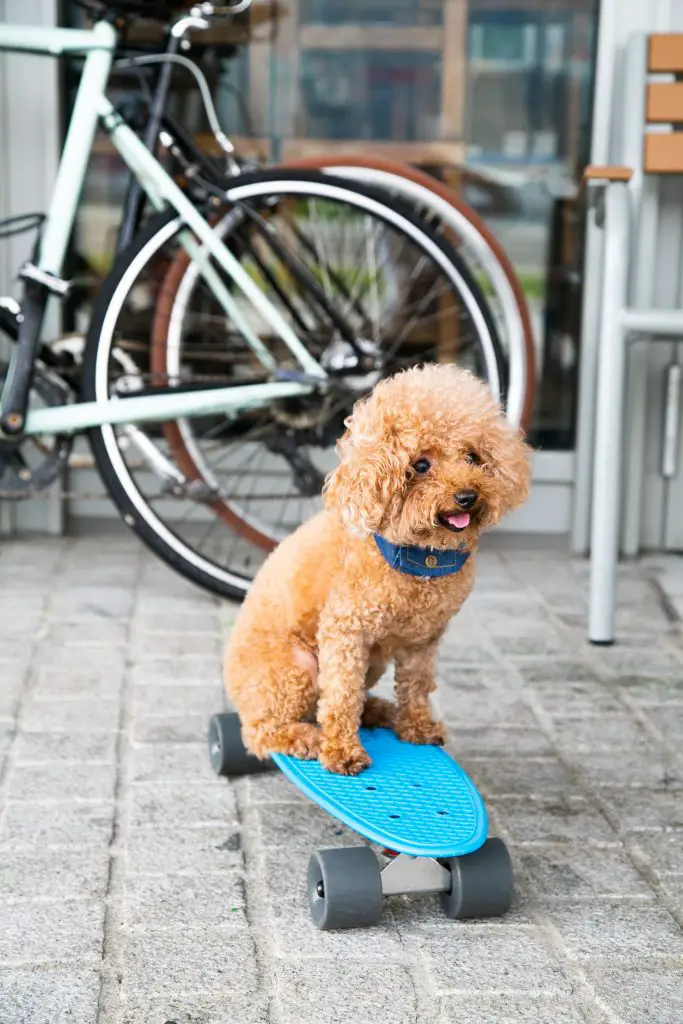How To Stop Your Poodle Barking: Complete Guide To Training Your Poodle To Be Quiet And Happy

Toy poodles, miniature poodles and standard poodles are wonderful dogs. Their beautiful curled fur and their excitable and intelligent nature make them rewarding pets. Poodles are good with families, children, and people with allergies because they are hypoallergenic (you can read more about this here). Poodles, surprisingly considering their looks, are also wonderful hunting dogs and are excellent waterfowl hunters (click here to read more about this).
However, poodles have become – somewhat unfairly – renowned for being loud and noisy: they bark—a lot.
Toy poodles, miniature poodles and standard poodles who have not been trained are especially prone to barking a lot, as they don’t know how annoying it can be to their owners.
But don’t let this reputation put you off! Barking is, typically, a way for dogs to communicate. There’s always a reason behind a bark. Luckily, because poodles are one of the most intelligent dog breeds around, they can be trained easily to stop barking if you are willing to put int the time it takes to train your poodle to stop barking.
Smaller dogs, like the toy and miniature poodle, have a reputation for barking more than larger dogs like the standard poodle. This is simply not true. Toy poodles(smallest), miniature poodles (medium), and standard poodles (large) all have the same tendency to bark.
This is because even though the three poodles appear different in terms of size, they are the same breed so have the same personality and traits. While some people swear that standard poodles are calmer, this is mostly anecdotal evidence and there is nothing concrete proving this is true. Something we do know is true is that all three poodle sizes are equally intelligent, so all three are equally easy to train against bad habits, such as barking. You can read more about poodle intelligence here!
Understanding the types of bark, why poodles bark, and how to stop a poodle barking are essential skills for an owner. It will help soothe your poodle and ensure a close bond, as well as giving you a more relaxing life and better night’s sleep. So, don’t spend days and nights begging them to stop- they can’t understand so it’s a waste of time! Read on, to discover more. I’m going to break down the reasons your poodle is barking- then it’s up to you to remove the cause of the bark and make your poodle quieter.
Aside from being annoying, barking can also be very intimidating to people who are not comfortable around dogs, or those who are afraid of dogs. So if you want other people to like being around your poodle as much as you do, you need to take action to stop your poodle barking. It is nearly impossible to relax with the sound of a dog barking- so it makes perfect sense that poodle and dog owners want to stop their dogs barking when it isn’t necessary.
Types of Barking For A Poodle

Poodles and all dogs bark. It is a good way for them to do the following:
- Communicating anything– if they are happy, excited, alarmed, upset… they will bark
- Getting attention– they know making a loud noise will get your to pay them attention
- scaring off anything (or anyone) that would do them harm– they know a loud bark can scare things away
Barks are loud and the sound can travel a great distance. The sound of a dog bark can actually travel up to two miles– great if your poodle wants to attract your attention from far away, but not so great if you are sat next to them or trying to sleep.
Smaller poodles, like the toy and miniature poodle have quieter, higher pitched barks than standard poodles. This is because the voice box of smaller dogs is also smaller- this is comparable to a small ukelele making a higher pitched noise than a large double bass.
First of all, we need to understand the different types of poodle barks. Broadly speaking, there are three main categories: Happy barks, Alarm barks, and Fearful barks. It’s really important you are able to distinguish between the three, as a happy bark, while annoying, is not something to worry about as your poodle is happy and not scared. An alarm bark is to let you know something has happened- such as a bird in the garden or someone arriving at the door.
However, if your poodle is barking out of fear, this is more difficult to stop, because if your poodle is scared they will not be ready to learn anything new (it would be like me trying to learn something new with a large spider crawling on my head- it would not go well!). So, the thing to do with this type is barking is to stop your poodle from being scared. If it is something that our poodle really has no reason to be scared of (like a balloon) then you will need to do more work to stop your poodle being scared. However, if your poodle is scared for a good reason, like an intruder, or someone threatening them, then barking is a natural response and is a good thing.
Naturally, there is a world of difference between these two. Each communicates an entirely different message. Here’s how to tell them apart.
Happy Barks
There are two types of happy barks:
- Excitement bark: Body language is as key to understanding your poodle’s bark, as the noise itself. The bark will be high-pitched and repetitive. Your dog will want to be noticed. Their tail will be wagging, and they may even be jumping up and down, or spinning in circles. Such barking is typical of a puppy. But even an adult dog can display such behavior.
- Playtime bark: Once again, high-pitched and repetitive. However, it will be accompanied by a low-intensity bark. Their body will be stretched out, paws in front, bottom in the air. They are ready to play.
Fearful Barks
There are a few types of fearful or worried barks. Here are the main ones:
- Low bark: Upon discovering a new object or thing, a poodle may bark in a low tone. It displays a sense of caution, as they decide if the new object is dangerous.
- Territorial bark: If your dog feels uncomfortable, likely due to an unwelcome stranger, then they will bark repeatedly. The barking will become more intense, the closer they are to the perceived threat. By the end, there may even be some growls.
- Growl: Such noise is a bad sign. Poodles will, usually, only growl if they are willing to attack. If combined with ‘tooth snapping’ noises or a crouched, striking position, deal with the situation cautiously.
- Howling, yelping or whining: Howling is a standard form of communication between dogs in the same area. However, yelping or whining can be a sign of separation anxiety. The absence of an owner is the primary cause. Often such anxiety is dismissed as annoying or being badly behaved.
- Fear barking: A high-pitched and repetitive noise usually caused by a specific place, person, or object. Poodles may become restless. They may urinate or lay flat with their ears low.
Type of Poodles: Do Some Poodles Bark More Than Others?

As we all know, different types of dogs display different personalities and temperaments. The same is true, albeit to a lesser extent, with poodles. There are three primary types of poodle (from smallest to largest): the toy poodle, the miniature poodle, and the standard poodle.
Smaller dogs are well-known for their punchy barks. We’ve all heard of ‘yappy’ little dogs. The reverse is true for poodles. The larger the size of the poodle, the louder the bark. However, all three types of poodle are equally as likely to bark, though the triggers may differ.
The benefit poodles have over other breeds is their intelligence. Some types of dogs can be frustrating to train, requiring weeks, months, or even years of careful instruction. In contrast, poodles are readily trained. They can be house-trained and thrive off mental stimulation. In part, this lies behind the reason why they bark; as we’re about to explore.
Why Do Poodles Bark When They’re Not Scared or Happy? (And how to help)
Like people, the smarter the dog, the more things are whirring round in their minds. They’ll notice things quickly. They’ll react accordingly. As such, the range of stimuli that can cause poodles to bark can be extensive. When trying to get poodles to stop barking, it is vital to identify the cause. Subsequently, action can be taken to rectify the source of the distress. Remove that, and the barking will stop.
Here are some of the most common causes:
Separation anxiety
Toy poodles, miniature poodles and standard poodles become attached to their owners. They learn to love them and miss their presence when they’re not there. Isn’t that part of the reason we love them in return? Their unconditional love and attention. However, as with all things, there is a downside. Dogs can suffer from separation anxiety.
When an owner is absent, or the poodle is left alone, feelings of stress and anxiety might begin. Eventually, this will lead to excessive barking.
There are several things you can do to reduce this tension. Consider the following:
- Provide your poodle with a view outside and plenty of light. They won’t want to feel secluded nor left in the dark (pun unintended).
- Play calming music while away. Many tracks exist on YouTube, repeating for hours, such as rainfall or jungle sounds. People often find them soothing, using them to relax. The same is true for dogs.
- Slowly condition your dog to your absence. It helps to get them to trust that you’re only going away temporarily. Once the trust is established, they will calm down. Therefore, slowly increase the increments of time for which you are absent.
Unknown People At Home
A poodle’s home is their castle: their territory. Well, actually, in their minds it’s yours, they’re just your guardian protector. If they sense something, they believe will cause you harm, they want to let you know. It’s hard to get angry at such a devoted dog. However, it can get pretty irritating if persistent; particularly if every passer-by gets the dog excited and barking.
- If your poodle is barking at passers-by, you could try closing the curtains or putting your poodle in another room where they can’t see the people. However, this is a short term solution and does not address the root cause of your poodle’s barking.
- As such, remember to socialize poodles from an early age: both with dogs and people. By adjusting to strangers, they are less likely to start barking, as they will have developed social skills. Try to socialize them with people and dogs of all ages and varieties. The more experience they get, the better they will be.
- You should keep socializing your poodle throughout their life, this is especially important if you do not have many visitors in your home. If you know any noisy children, invite them over to play with the dog (with their parent’s permission and with supervision of course).
- You could also try throwing a few parties, and encourage your poodle to get to know the visitors. This will help your poodle get used to all kinds of people, children and behavior. When out for walks, allow your poodle to play with other dogs and greet people in a polite manner. This will help your poodle become relaxed around more people and other dogs.
Your Poodle is Overprotective
If the problem is that your poodle is very overprotective of you and not just alerting you of people walking by there are a few things you can do.
- The first is letting your poodle know you are ok and not at risk of any danger. Poodles are intelligent so should be able to read our tone of voice and body language and if you reassure them you are ok, calm, and collected they will eventually learn they don’t need to protect you and will stop barking in this situation.
- You could also try a distraction technique, such as playing fetch with your poodle at this point. You could also ask them to go to their bed, as this is something most poodles are used to doing. Most poodles like their bed and this should not be seen as a punishment, but rather moving your poodle to somewhere where they will not be triggered.
- You should teach your poodle to respond to a recall command such as “come” or “here”. That way of they are barking a lot ar someone, they will return to your side and the distraction will likely cause them to stop barking.
- You could also teach your poodle to recognize the word “quiet”. If your poodle is barking, try saying quiet in a calm but firm voice. Then wait for your poodle to become quiet (even if it is only for a short time, such as for them to draw breath) and give them a treat and praise them. Eventually, your poodle will learn that the word quiet means that if they stop barking they will get a treat.
- You should never punish your poodle for barking if they are being protective, in their mind, they were doing you a favor and showing their love by trying to protect you. So, any punishment will make them very confused and could damage the trust your poodle places in you. Instead, give him lots of affection and attention, to really let him know that you are fine and he doesn’t need to worry.
What To Do If Your Poodle Is Upset by Loud Noises
Alongside their incredible intelligence, toy poodles, miniature poodles and standard poodles also come with some stunning senses. Their hearing is unparalleled compared to ours. However, this can mean loud noises, such as fireworks or thunderstorms, which will lead to barking, growling, and howling. Such loud noise is understandably frightening to dogs, especially considering they occur so infrequently. However, while television shows will try and make you think that all dogs get upset and bark at loud noises, this is simply not the case. Lots of dogs are able to remain calm, composed, and quiet during thunderstorms, with the right training and reassurance.
At the end of the day, there are always going to be times when the noise outside will be very loud- from fireworks to storms to neighbours to car alarms and there is no getting away from this. Your poodle needs to get used to this and needs to know that barking will not help.
- You can help by gradually exposing your poodle to louder and louder noises. Similar to separation anxiety, don’t drop them in the deep end. Instead, incrementally increase the sound on the TV or music player. If you can, play the sound of a thunderstorm for maximum effect. This will get your poodle used to the noise and they will become more comfortable with this over time.
- You can also reassure them during the loud noises and flashing lights. They’re scared, and so will crave comfort during this time, so affection and soothing words and tone of voice will go a long way to help your poodle. If you show your poodle that you are not scared and there is nothing to fear, eventually your poodle will think the same.
What To Do If Your Poodle is Trying to protect Themselves
Loyalty is an admirable quality. We want our dogs to adore us. But we also know they can fend for themselves, defending their own territory and person from attack. These protective instincts are ingrained in poodles. Nor are they intrinsically bad. The problem is with an overprotective dog.
- If your poodle is likely to react to anything, reassure them that everything is okay. You are trying to build an association between the event and the response. Do not bark back or raise your voice. Your dog can’t speak fluent English: they react to tone. Loud and bombastic responses will further rile them up. Never say “no”. They will interpret this as a bark.
- A situation that poodles can feel very vulnerable in is during meal times and while drinking. If they feel threatened while they are trying to eat, this can result in barking. Do not disturb a poodle while they are eating.
- Give them their own space for dinner, with their own bowls. You should not put your poodle’s food and drink bowl close to other animals’ food and drink bowls. This can cause your poodle to become upset and cause fights between your poodle and other pets. Poodles are as protective of their food as they are of you. Let them enjoy their meal in peace and do not try and go near your poodle or disturb them while they are eating.
What To Do if Your Poodle is Barking Because of Boredom or Overexcitement
Poodles can be a tale of two dogs. Not enough stimulation and they descend into chronic boredom. They will become restless and angsty. They will bark incessantly for lack of anything better to do. They may even become destructive: anything to pass the time.
- In the former and they are bored, keep them active and play with them as much as possible. Take them out on walks; playing a fun game of fetch or teach them a new trick.
- Poodles require lots of attention and activity, so try to keep them engaged as much as possible. Also, give them lots of praise and affection.
On the other hand, too much stimulation, and they struggle to calm down. They will bark and bark after an exciting and fun day. Their happiness is wonderful but exasperating.
- If your poodle has become overexcited, you need to train them to stay calm. Ignore them when they bark. Then when they quieten down, go and give them lots of affection. Follow this pattern, and you will teach your dog that the quickest way to get your attention is to stay calm.
- If your dog will not calm down regularly, you should put in some hours training them different commands when they are calm, which you can then use when they are hyperactive and barking. You should train your poodle to come, sit and lie down to a good standard, rewarding them for this good behavior. That way, when they are hyperactive you can make them focus on these tasks and help your poodle calm down by distraction.
12 Top Tips To Stop A Poodle Barking
- Never shout or say no to your poodle when they bark. Poodle, while smart, do not understand human speech properly. Your poodle will not know that you are asking them to stop barking, but may actually think you are joining them and this can encourage them to bark more! As a lot of barking is your poodle wanting your attention, one of the best things to do when your poodle barks is to ignore them. That way, over time your poodle will learn that barking does not get your attention and they will stop doing it or this reason.
- In contrast to this, when your poodle is not barking, give them lots of attention, play, stimulation, and love. If a poodle is getting your attention and feels loved and secure they are far less likely to resort to barking to get your attention. If your poodle is getting enough play and stimulation they are less likely to bark out of boredom, as they will not be bored.
- Let your poodle know when you are feeling safe and happy by keeping your tone of voice calm. Alternatively, if you feel scared, let your poodle know, so they can start learning how to read your mood. This will help them know when to bark (an intruder) and when not to bark (someone walking on the street outside).
- Make sure your poodle is comfortable with all kinds of people and other dogs, children, and people by socializing them from an early age and continuing to do so throughout their life.
- Desensitize your dog to whatever is triggering their barking- this could be being left alone, the vacuum cleaner, loud noises… gradually increase the exposure to the trigger over time and make sure to give lots of reassurance and love afterward.
- You should try teaching your poodle to recognize the word “quiet”. If your poodle is barking, try saying “quiet” in a calm but firm voice. Then wait for your poodle to become quiet (even if it is only for a short time, such as for them to draw breath) and give them a treat and praise them. Eventually, your poodle will learn that the word quiet means that if they stop barking they will get treat.
- Never punish your poodle for barking, if anything this can make them bark more as it can make them scared- a common barking trigger. Remember that all dogs and poodles naturally bark and in the poodle’s eyes they are not doing anything wrong by barking, so they will not understand that the reason they are being punished is for barking and will keep on barking.
- Make sure your poodle has their own space to relax in at home where they will not be disturbed. This is very important as poodles need a place to go if they are scared, overwhelmed, tired, grumpy, or just plain anti-social. This can help stop a poodle from being overwhelmed or overexcited and will be a great comfort to your poodle.
- Make sure your poodle has their own space to eat and drink and never allow anyone to disturb your poodle while they are eating and drinking. Poodles feel vulnerable when eating and drinking and if they feel threatened or uncomfortable this can make them bark and become agitated.
- Make sure your poodle is getting plenty of exercise and stimulation so they are not bored, but not so much they become overexcited. This may sound like a difficult balance to reach, but you should be able to find out what is a good amount for your poodle based on their behavior and if they seem happy and relaxed. Make sure your poodle has plenty of toys and is getting at least an hour exercise a day.
- Be patient. Barking is natural and your poodle will not automatically know it is something you want them to stop. Trying to reduce your poodle’s barking will take time and repetition of the techniques recommended above. It can take months for a reduction in barking, and if your poodle has been barking a lot for years and years it will take even longer as it will be a habit.
- If you enjoy teaching your poodle fun tricks, a final thing to try is teaching your poodle a “speak” command. This is where you train your intelligent poodle to bark when instructed and treat and praise them for doing so. This will, over time, give your poodle the message that barking is only something to do when asked and is a special occasion and not something to do all the time.
So, there you go—the complete guide to poodles and barking. As we said, poodles are fantastic dogs: giant, fluffy bundles of love, affection, and energy. However, they do require a little more training. Remember, identify the cause of the barking first, then take steps to resolve the fear or anxiety. Once the trigger has been removed, the barking should subside.


Pingback: 10 + 5 Most Popular Dog Breeds in Brazil - Praise The Dogs